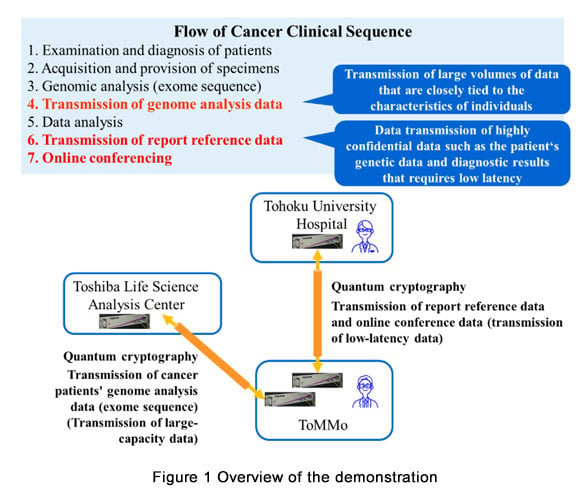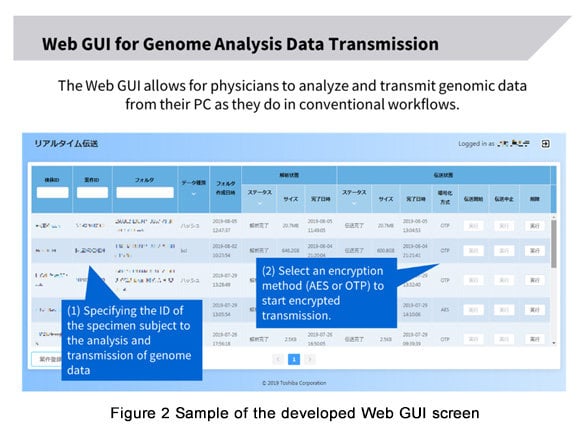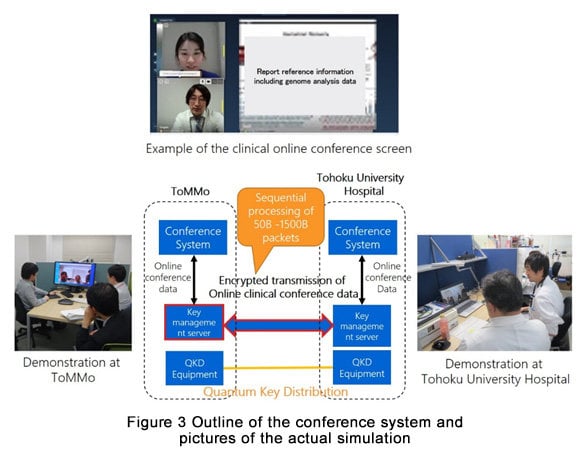www.industry-asia-pacific.com
12
'20
Written on Modified on
World's First Development and Demonstration of a Quantum Cryptographic Communication Technology Applied System for Genomic Medicine
Quantum cryptographic communication technology allows for completely secure real-time transmission of genome analysis data and transfer of online expert panel data.

Toshiba Corporation (TOKYO: 6502), Tohoku University Tohoku Medical Megabank Organization (ToMMo) and Tohoku University Hospital have demonstrated that quantum cryptographic communications technology can provide genomic medicine with a safe, completely secure data management environment. This was achieved by (1) developing a system which applies quantum cryptographic communications technology to clinical sequencing, and (2) using that system to safely transmit cancer genome analysis data (exome sequence (Note 1) data), via online expert panel attended by physicians and other experts to analyze the sequenced data (Figure 1). This is the world's first development and demonstration of a system using quantum cryptographic communication technology in the field of genomic medicine(Note 2).
Clinical sequencing is a new examination in genomic medicine that uses a next-generation sequencer to read a patient’s gene sequence at ultra-high speed. The results of the genomic data analysis are then provided to physicians and other experts to assist in patient diagnosis and treatment selection. This system builds on and extends capabilities that Toshiba and ToMMo announced in January of this year, and the achievements of this demonstration are a major step toward a practical system that will provide safe and secure genomic medicine.
This research was carried out as part of the Strategic Innovation Creation Program (SIP) of the Council for Science and Technology and Innovation of the Cabinet Office, "Society 5. 0 Realization Technology Utilizing Light and Quantum" (Quantum Science and Technology Research and Development Organization). Toshiba, ToMMo and Tohoku University Hospital will present the details of the demonstration and the technology at the International Conference QCrypt 2020 (10th International Conference on Quantum Cryptography) on August 10-14.
Details
In January this year, Toshiba and ToMMo announced on a series of experiments of quantum cryptography transmission that took place in July and August 2019 that succeeded in transmitting whole-genome sequence data for the first time anywhere in the world (Note 3). Since then, and joined by Tohoku University Hospital, they have advanced the research by focusing on two areas related to clinical sequencing of cancer patients: the type of data that must be kept confidential; and methods to utilize quantum cryptographic technology in data decryption.
Clinical sequencing covers genome analysis data which is highly confidential personal information closely related to one’s health and physical condition that must be kept secure. For the same reason, support is also needed for the data generated by online expert panel attended by physicians and experts who share patient’s genetic data and diagnostic results via remote access.
After considering this, Toshiba, ToMMo and Tohoku University Hospital successfully demonstrated encryption in two areas using quantum cryptographic communication technology:
A) Real-time transmission of genome analysis data (exome sequencing data)
B) Data transmission for an online expert panel, including analyzing results over conference audio and visual feeds.
Implementation of A:
Transmission of genome analysis data uses a one-time pad (Note 4) cryptography that Toshiba and ToMMo announced in January 2020 (Note 3). Genome data is encrypted as it is sequenced, with a cryptographic key distributed from the quantum key distribution system, and transmitted using the one-time pad. The transmission system is designed for ease of use. Menus on the operator’s screen allow simple selection of the number of the specimen for analysis, and of the transmission method.

Implementation of B:
A secure environment for expert panel was achieved by setting up two-way transmission of audio-visual signals that is linked to a key management server that stores and manages quantum cryptographic keys. This server receives audio-visual feeds from an on-site conferencing system, uses a one-time pad to encrypt it, and transmits it to another key management server at a different site. It uses the same one-time pad to decrypt encrypted audio-visual feeds from the other site, and transfers it to the in-house conference system. The outcome is a totally secure environment where genome data can be discussed with confidence.
Toshiba, ToMMo and Tohoku University Hospital tested this system from January to July this year. They performed a real-time transmission of 96 specimens of exome sequence data from the genomes of cancer patients of Tohoku University Hospital, and simulated a 65-minute online conference attended by a total of 10 physicians and other medical professionals. The results confirmed that quantum cryptographic communications technology supported large-scale data transfers at the genome scale, and responsive, real-time case conferencing.
These results confirm that quantum cryptographic communications realize secure data transfers and support real-time communications and diagnostics. In addition to providing a secure basis for professionals working in genomic to share and discuss highly confidential personal data, it also points the way to the future development of telemedical services, where patients in remote locations can trust the privacy of consultations with physicians.

Overview of the Demonstration

Toshiba will continue to work toward practical application of quantum cryptography in high security areas, including medical, financial and communications infrastructure. ToMMo and Tohoku University Hospital will continue close collaboration in promoting the use of safe and secure ICT technologies to support medical treatment based on genomic information.
(Note 1) Exome sequencing
A technique that efficiently detect mutations (SNV (SNP)/InDel) in exons by limiting sequencing to exons, the portion of the gene that code for proteins. This differs from whole-genome sequencing which analyzes the entire genome sequence, and to SNP arrays which comprehensively analyze the existing SNPs on the whole-genome.
(Note 2) Based on Toshiba’s internal investigation in July 2020.
(Note 3) "World-first Demonstration of Real-time Transmission of Whole-genome Sequence Data Using Quantum Cryptography", announced on January 14, 2020. https://www.toshiba.co.jp/rdc/rd/detail_e/e2001_01.html
(Note 4) One-time pad
A common key cryptosystem that uses a single-use encryption key which has the same length as the plaintext.
www.toshiba.co.jp.com

